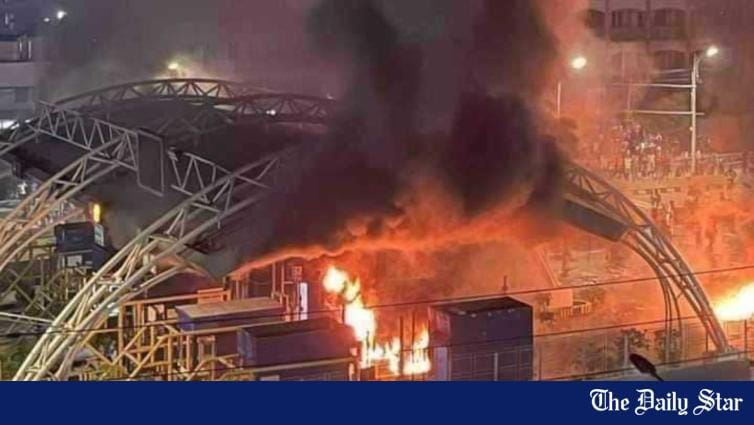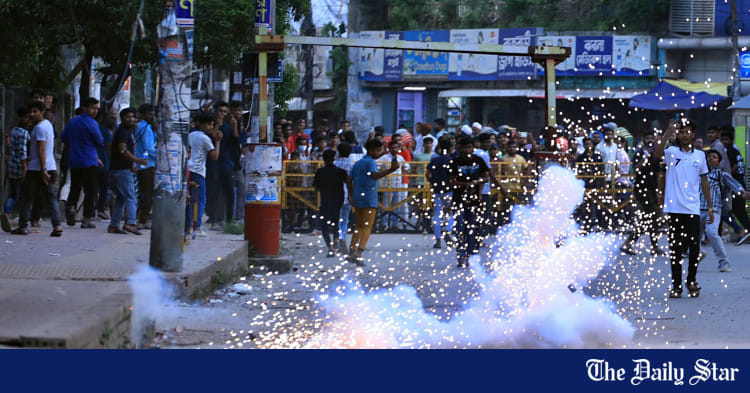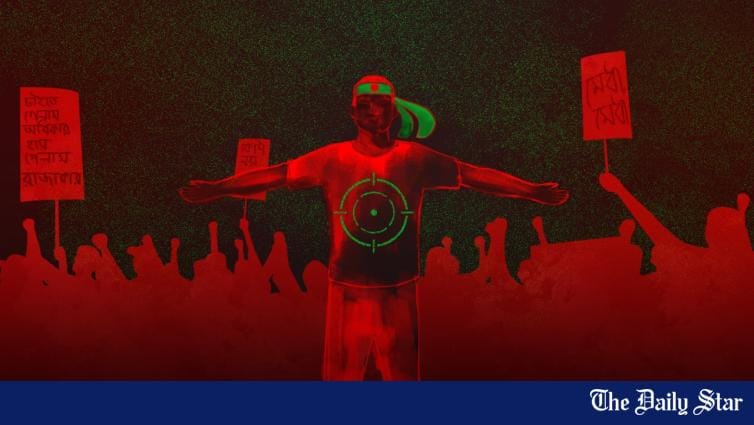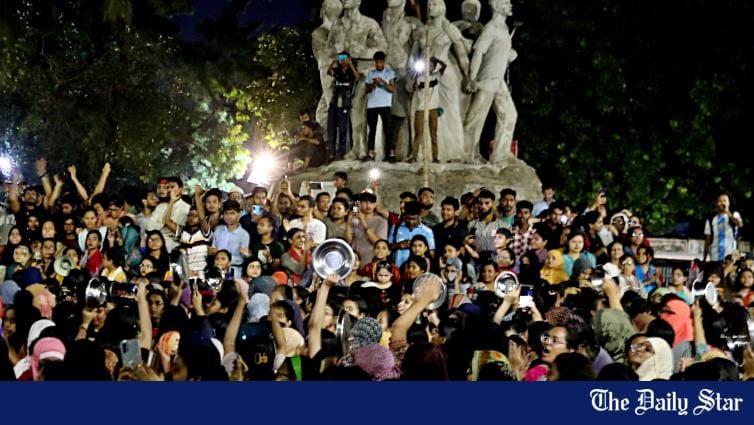
Will the "liberation war spirit" be upheld by assaulting students?
Incumbent government that ostensibly upholds the spirit of the liberation war must take blame for the hatred that has emerged in the mind of young students
Will the "liberation war spirit" be upheld by assaulting students?
Who is responsible for crushing the spirit of the youth of today with blatant discrimination, driving them to label themselves "razakar"? Who is responsible for generating an adverse reaction to the "liberation war and the liberation war spirit", for creating divisions? Was it necessary to make these youth opponents?
Nadim Mahmud
Updated: 17 Jul 2024, 09: 46

Bangladesh Chhatra League activists attacking protesters of the quota movement. Monday at Dhaka UniversityProthom Alo
The main focus of a student upon joining university is studies, preparing to be a citizen of the world. But in our country the students leave their classes to take to the streets, sometimes rallying for an extension of the age to join public service, or sometimes demonstrating for reforms of the quota system for government jobs. They end up covered in blood, wounded physically and mentally.
In recent times Bangladesh's "general students" had been carrying out a peaceful movement in demand of reforms in the quota system for government jobs. But that has now turned into bloodshed. The students and teachers of various universities around the country have been assaulted and beaten up in the deep of night. Many of them have been injured and hospitalized.
No matter who takes responsibility for the fact that the state of our higher education remains the same even 53 years after the country's independence, the incumbent government that ostensibly upholds the spirit of the liberation war must take blame for the hatred that has emerged in the mind of these young ones.
Though the "strategy" is nothing new for "demands" to be met through bloodshed and violence, this is a time when our students should be thinking about the country, about preparing themselves for the emerging global order. Instead our students are having to take to the streets. This is a matter of anguish. The minds of the younger generation are being poisoned. But why should things be like this? Why should our girls and boys have to rally on the streets time and again?
Three and half hundred members of parliament have taken on responsibility as lawmakers. But they never speak of the suffering and angst of our younger generation in parliament. They never raise the demand there for an ideal and pragmatic policy regarding our job system
Election controversies aside, in constitutional continuity there is a "parliament" functioning in the country. Three and half hundred members of parliament have taken on responsibility as lawmakers. But they never speak of the suffering and angst of our younger generation in parliament. They never raise the demand there for an ideal and pragmatic policy regarding our job system. Not one of our members of parliament has stood up in the House on behalf of the students to voice their grievances, to draw the government into the issue.
So what should the discussions be in this parliament running on taxpayers' money?

Three attackers open fire on the agitating students. Monday, Dhaka UniversitySazid Hossain
As things stand, no justified demand is fulfilled without any movement or struggle. That is why one looks to the head of government for the demands to be met. That happened this time too.
Six years ago, at the cost of their studies, the students had demonstrated and their demands were met. Why has that demand been rendered void, forcing the students to take to the streets again? The students hadn't wanted abolition of the quota system, they had wanted reforms. The quota had been revoked upon executive order of the head of government. A case was filed in court against the order and now the complications reared up once again.
So who is responsible for crushing the spirit of the youth of today with blatant discrimination, driving them to label themselves "razakar"?
Truth be told, there hardly is anyone who denies the need for reforms in the quota system. The policymakers should be planning and thinking of how to bring this about. We must keep in mind that a large section of those of the ruling party in the 2008 election were youth. Those young people were inspired by the spirit of the liberation war. In 2013 they demanded that the razakars and Al-Badr be hanged. Those youth of back then are now in different in various responsible positions. They should have been taking the spirit of the liberation war ahead.

Girl students being attacked.Dipu Malakar
So who is responsible for crushing the spirit of the youth of today with blatant discrimination, driving them to label themselves "razakar"? Who is responsible for generating an adverse reaction to the "liberation war and the liberation war spirit", for creating divisions? Was it necessary to make these youth opponents?
It must be kept in mind that today the thousands of boys and girls have taken to the streets basically to resolve the issue of unemployment.
They have successfully created a unity to eliminate discrimination in government jobs. Our ruling class must acknowledge this. The government should have the capacity to understand the mental state of these students.
They should have the consideration not to view the students as opponents akin to the political opposition.

Chhatra League assaulting girl students. Monday at Dhaka UniversityProthom Alo
If the government takes it upon them to boost the "anti liberation war" quarters because of this change in the generation, then we must realise that they have failed to spread the dream of our great independence among the youth. We must understand the difference between national divide and ideological divide.
If those in power think that they can strengthen the "pro-liberation forces" by rehabilitating the grandchildren of the freedom fighters to honour them, then the students who have been admitted on the freedom fighter quota would not join the movement for quota reforms in government jobs.
The government must realise that they cannot bolster the spirit of the liberation war by beating up the general students. Instead they should realise the need for quota reforms to ensure equal rights in public service on the basis of qualifications (merit is not quite the word).
Make a commission for quota reforms, discuss the matter. Use your brains to assess the quota reforms that are required, ensuring the inclusion of the backward communities and women.
It must be kept in mind this use of force that is creating harm, is simply serving to strengthen the anti-independence forces. The decision lies with you, do you want bloodshed to poison the mind of the youth, or do you really want them to uphold the spirit of the liberation war and Bangladesh in their minds and hearts?
* Dr Nadim Mahmud is a researcher at California University.
Who is responsible for crushing the spirit of the youth of today with blatant discrimination, driving them to label themselves "razakar"? Who is responsible for generating an adverse reaction to the "liberation war and the liberation war spirit", for creating divisions? Was it necessary to make these youth opponents?
Nadim Mahmud
Updated: 17 Jul 2024, 09: 46
Bangladesh Chhatra League activists attacking protesters of the quota movement. Monday at Dhaka UniversityProthom Alo
The main focus of a student upon joining university is studies, preparing to be a citizen of the world. But in our country the students leave their classes to take to the streets, sometimes rallying for an extension of the age to join public service, or sometimes demonstrating for reforms of the quota system for government jobs. They end up covered in blood, wounded physically and mentally.
In recent times Bangladesh's "general students" had been carrying out a peaceful movement in demand of reforms in the quota system for government jobs. But that has now turned into bloodshed. The students and teachers of various universities around the country have been assaulted and beaten up in the deep of night. Many of them have been injured and hospitalized.
No matter who takes responsibility for the fact that the state of our higher education remains the same even 53 years after the country's independence, the incumbent government that ostensibly upholds the spirit of the liberation war must take blame for the hatred that has emerged in the mind of these young ones.
Though the "strategy" is nothing new for "demands" to be met through bloodshed and violence, this is a time when our students should be thinking about the country, about preparing themselves for the emerging global order. Instead our students are having to take to the streets. This is a matter of anguish. The minds of the younger generation are being poisoned. But why should things be like this? Why should our girls and boys have to rally on the streets time and again?
Three and half hundred members of parliament have taken on responsibility as lawmakers. But they never speak of the suffering and angst of our younger generation in parliament. They never raise the demand there for an ideal and pragmatic policy regarding our job system
Election controversies aside, in constitutional continuity there is a "parliament" functioning in the country. Three and half hundred members of parliament have taken on responsibility as lawmakers. But they never speak of the suffering and angst of our younger generation in parliament. They never raise the demand there for an ideal and pragmatic policy regarding our job system. Not one of our members of parliament has stood up in the House on behalf of the students to voice their grievances, to draw the government into the issue.
So what should the discussions be in this parliament running on taxpayers' money?
Three attackers open fire on the agitating students. Monday, Dhaka UniversitySazid Hossain
As things stand, no justified demand is fulfilled without any movement or struggle. That is why one looks to the head of government for the demands to be met. That happened this time too.
Six years ago, at the cost of their studies, the students had demonstrated and their demands were met. Why has that demand been rendered void, forcing the students to take to the streets again? The students hadn't wanted abolition of the quota system, they had wanted reforms. The quota had been revoked upon executive order of the head of government. A case was filed in court against the order and now the complications reared up once again.
So who is responsible for crushing the spirit of the youth of today with blatant discrimination, driving them to label themselves "razakar"?
Truth be told, there hardly is anyone who denies the need for reforms in the quota system. The policymakers should be planning and thinking of how to bring this about. We must keep in mind that a large section of those of the ruling party in the 2008 election were youth. Those young people were inspired by the spirit of the liberation war. In 2013 they demanded that the razakars and Al-Badr be hanged. Those youth of back then are now in different in various responsible positions. They should have been taking the spirit of the liberation war ahead.
Girl students being attacked.Dipu Malakar
So who is responsible for crushing the spirit of the youth of today with blatant discrimination, driving them to label themselves "razakar"? Who is responsible for generating an adverse reaction to the "liberation war and the liberation war spirit", for creating divisions? Was it necessary to make these youth opponents?
It must be kept in mind that today the thousands of boys and girls have taken to the streets basically to resolve the issue of unemployment.
They have successfully created a unity to eliminate discrimination in government jobs. Our ruling class must acknowledge this. The government should have the capacity to understand the mental state of these students.
They should have the consideration not to view the students as opponents akin to the political opposition.
Chhatra League assaulting girl students. Monday at Dhaka UniversityProthom Alo
If the government takes it upon them to boost the "anti liberation war" quarters because of this change in the generation, then we must realise that they have failed to spread the dream of our great independence among the youth. We must understand the difference between national divide and ideological divide.
If those in power think that they can strengthen the "pro-liberation forces" by rehabilitating the grandchildren of the freedom fighters to honour them, then the students who have been admitted on the freedom fighter quota would not join the movement for quota reforms in government jobs.
The government must realise that they cannot bolster the spirit of the liberation war by beating up the general students. Instead they should realise the need for quota reforms to ensure equal rights in public service on the basis of qualifications (merit is not quite the word).
Make a commission for quota reforms, discuss the matter. Use your brains to assess the quota reforms that are required, ensuring the inclusion of the backward communities and women.
It must be kept in mind this use of force that is creating harm, is simply serving to strengthen the anti-independence forces. The decision lies with you, do you want bloodshed to poison the mind of the youth, or do you really want them to uphold the spirit of the liberation war and Bangladesh in their minds and hearts?
* Dr Nadim Mahmud is a researcher at California University.













